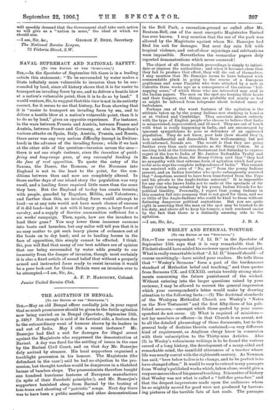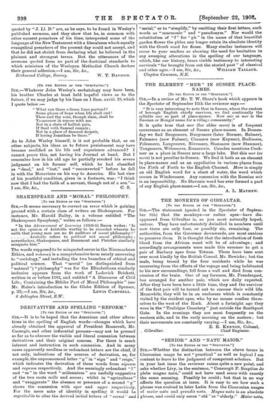JOHN WESLEY AND ETERNAL TORTURE.
ILTO THE EDITOR OF THE "SPECTATOIL.”.1 SIR,—Your correspondent "J. Ll. D." in the Spectator of September 15th says that it is very remarkable that Dr. Fitchett should have misled his reviewer upon the above subject. What is really remarkable is that "J. Ll. D." himself should—of course unwittingly—have misled your readers. He tells them that "'Wesley's Sermons' form a part of the burdensome standard of Methodist belief and teaching," and then quotes from Sermons CX. and CXXIII. certain terribly strong state- ments concerning the future punishment of the wicked. Without entering into the larger questions raised by your reviewer, I may be allowed to correct the general impression which your correspondent's letter would make by drawing attention to the following facts :—(1) The doctrinal standards of the Wesleyan Methodist Church are Wesley's "Notes on the New Testament" and the first fifty-three of his pub- lished sermons,—amongst which those quoted by your corre- spondent do not occur. (2) What is required of ministers— not lay members or officers—in that Church is an assent, not to all the detailed phraseology of those documents, but to the general body of doctrine therein contained,—a very different kind of requirement, as Anglican clergy know in connexion with their subscription to the Thirty-nine Articles. Also (3) in Wesley's voluminous writings is to be found the various record of a long history, the development of a many-sided and remarkable mind, the manifold utterances of a teacher whose life was nearly coeval with the eighteenth century. As Newman has said, "here below to live is to change, and to be perfect is to have changed often." It would be easy to extract many passages from Wesley's published works which, taken alone, would give a very erroneous idea of his general teaching. It is matter of history that Wesley was not what is called a "hell-fire preacher," and that the deepest impressions made upon the audiences whom he so mightily moved for good were not produced by harrow- ing pictures of the terrible fate of lost souls. The passages quoted by "J. Ll. D." are, as be says, to be found in Wesley's published sermons, and they show that he, in common with other earnest preachers of his time, interpreted some of the language of the New Testament with a literalness which equally evangelical preachers of the present day could not accept, and that he did not shrink from declaring what he believed in the plainest and strongest terms. But the utterances of the sermons quoted form no part of the doctrinal standards to which ministers of the Wesleyan Methodist Church declare their general adhesion.—I am, Sir, &e.,







































 Previous page
Previous page